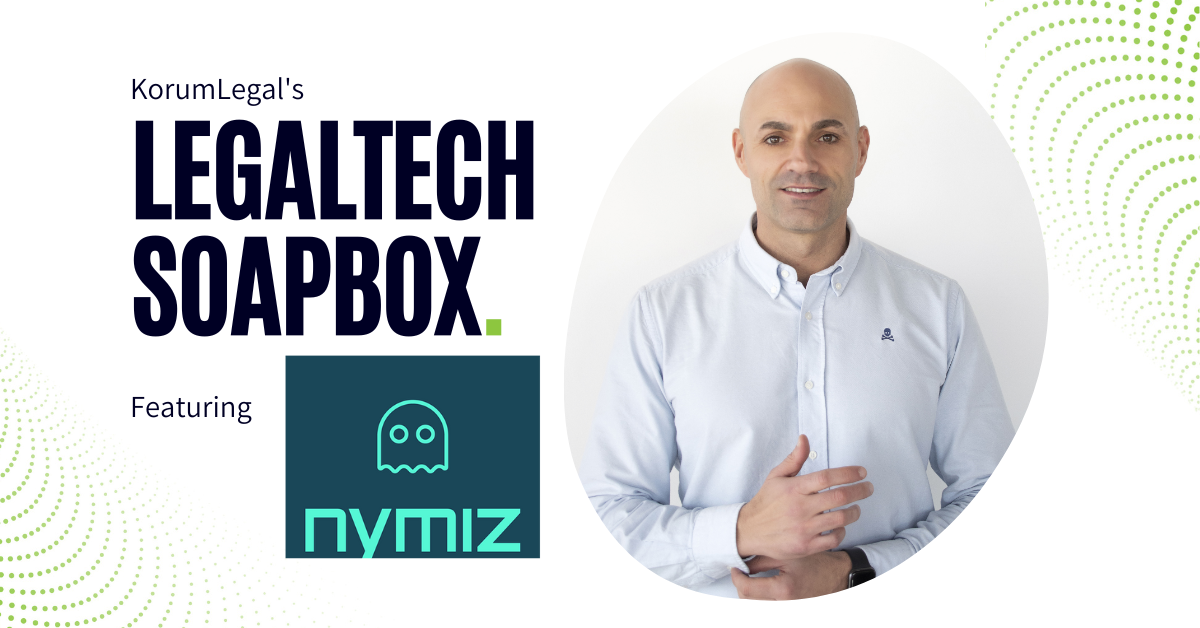LegalTech Soapbox: Improve your daily operations with Nymiz.

1. Hi Oscar, tell us the story behind Nymiz
We founded Nymiz in February 2020 as a spin-off from a company specialising in anonymising legal rulings for the Spanish judiciary. Shortly thereafter, Nymiz became an independent company focused on leveraging AI to anonymise sensitive data. Our journey was also shaped by the extensive cybersecurity experience of both founders, particularly in safeguarding privacy while managing large volumes of data and training machine learning models.
We recognised that the legal and government sectors handle vast amounts of sensitive information and require robust tools to ensure privacy protection.
2. What are the services or products that Nymiz provides?
Nymiz is an AI-Driven Data Anonymisation and Redaction software that allows organisations to replace sensitive information with synthetic data, tokenisation or asterisks. This eliminates the possibility of compromising data privacy while maintaining the usability and context of the data, making it suitable for data sharing and machine learning applications.
3. How does the above optimise the daily operations of an in-house legal team/ law firm?
Nymiz enhances the operations of in-house legal teams and law firms in the following ways:
- Automating Data Anonymisation: Nymiz automates the anonymisation of sensitive information in legal documents, replacing personal data with synthetic data, tokens, or asterisks. This automation reduces the time and resources spent on manual redaction, allowing legal professionals to focus on more strategic tasks.
- Ensuring Compliance with Data Protection Regulations: By anonymising personal data, Nymiz helps legal teams comply with data protection laws such as GDPR, CPRA, and HIPAA. This compliance mitigates the risk of legal penalties and enhances client trust.
- Enhancing Data Security: Nymiz's platform safeguards information across various data formats, including extensive databases and unstructured documents. By utilising advanced anonymisation and pseudonymisation methods, it effectively conceals personal details while retaining the data's intrinsic value, thereby reducing the risk of data breaches.
- Safe Data Sharing and Collaboration: The platform enables legal teams to share anonymised data securely with external parties, such as consultants or opposing counsel, without compromising client confidentiality. This capability promotes efficient collaboration and information exchange.
- Supporting Multilingual Operations: Nymiz processes data in 102 languages, allowing legal teams operating in diverse linguistic environments to anonymise documents effectively, ensuring consistent data protection across jurisdictions.
By integrating Nymiz into their workflows, legal teams can streamline operations, enhance compliance, and improve overall efficiency.
4. What do you believe will be the most significant change in how in-house legal teams use technology in the next 10 years?
In the next decade, the most significant change in how legal teams use technology will likely stem from the integration of advanced artificial intelligence (AI) and machine learning (ML) for decision support, data management, and predictive analytics. Here’s how I envision it impacting legal teams:
- Automated Legal Analysis and Document Generation: Advanced AI will enable legal teams to conduct complex legal research, generate first drafts of documents, and perform contract analysis with unprecedented speed and accuracy. AI-driven platforms will handle routine document preparation, allowing lawyers to focus on more strategic work.
- Predictive Analytics and Litigation Outcomes: Machine learning algorithms will analyse historical data to predict case outcomes, settlement probabilities, and even the behavior of opposing counsel and judges. This predictive insight will assist legal teams in making more informed strategic decisions, reducing the risk of unfavorable outcomes.
- Enhanced Data Privacy and Compliance Solutions: Legal technology will advance to support automated compliance with constantly evolving data protection regulations. Real-time data anonymisation, encryption, and consent management systems will become standard, ensuring that firms remain compliant globally while minimising manual compliance work.
- Blockchain for Contract and Evidence Management: Smart contracts on blockchain platforms will become more common, especially in corporate law, enabling self-executing agreements with enforceable terms encoded directly within the blockchain. This will streamline contract management, ensuring transparency, and reducing disputes. Blockchain could also secure the chain of custody for evidence, especially digital evidence, reducing risks of tampering.
- Intelligent Collaboration Tools: Collaboration tools powered by AI will enable legal teams to work across jurisdictions seamlessly. These tools will offer real-time language translation, automated summarisation, and task management features, making cross-border collaboration efficient and reducing time spent on administrative tasks.
- Virtual Legal Assistants and Chatbots: Virtual assistants will handle routine queries from clients or other departments, making legal services more accessible and enabling legal teams to focus on complex issues. These chatbots will evolve to provide sophisticated, context-sensitive answers based on historical data and legal precedent.
These technological advancements will ultimately shift legal teams toward a more data-driven, proactive, and strategic approach, where AI and automation handle much of the procedural and repetitive work. This shift will redefine roles within legal teams, with human lawyers increasingly focusing on tasks requiring nuanced judgment, negotiation, and client interaction.
Lily Evans and Oscar Villanueva Cañizares
Dec 13, 2024
Related Posts.
By: Lily Evans and Amanda Levay
LegalTech Soapbox: Streamline and safeguard your daily operations with Redactable
1. Hi Amanda, tell us the story behind Redactable.
As a loan consultant, I discovered firsthand that simply drawing black boxes over sensitive information in PDFs didn't actually remove the data,..
By: Lily Evans and Cora Ang
GC Spotlight: Cora Ang leverages LegalTech and process optimisation to amplify legal impact
Featured in our GC Spotlight Series this month is Cora Ang, the Head of Legal & Compliance, APAC at AMINA Group. At AMINA, Cora is responsible for all legal and compliance operations across the..
